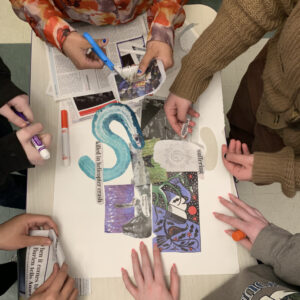 Author:
Author:
- Paula Saravia, she/her/ella, Assistant Teaching Professor, Anthropology, University of Washington, Seattle campus
Project Description
This project aimed at creating equitable and democratic opportunities for students to engage in class discussions. By following a sociocratic model, I have designed activities that allow students to participate in different capacities and contribute to our class discussions from a place where they feel comfortable. The students described their experience as favorable because instead of feeling that they “have” to speak, they engage at the point where they are. In addition, they appreciated being part of a community of knowledge where all forms of knowledge are valued, including family memories and trajectories and everyday life observations, for example. This inclusive and more equitable approach was particularly beneficial for students who needed accommodations for medical absences, care-taking responsibilities, or work-related absences and cannot attend lectures. By the end of the quarter, students reported feeling more confident in expressing their ideas and being better listeners to their peers’ ideas.
Project Question
Classroom engagement has been challenging for our students after years of remote learning and asynchronous engagement. Many of them suffer from severe anxiety when interacting with their peers in class, especially in group discussions that center on experiences of illness and healing. My challenge has been to support our students by opening democratic avenues for engagement in class in ways that recognize the structural forces that shape students’ experiences in the classroom.
Context
I teach medical anthropology courses during the regular academic year and in the summer (full-term). Most of them are small or mid-size, ranging from 15 to 50 students, and we meet twice a week for 110 minutes. These courses are electives, and students from all over campus enroll in them.
Methods
I use sociocracy as the main philosophy for guiding class discussions and small group work. Sociocracy is a system of governance that promotes equity and participation in psychologically safe environments. Unlike the usual participation methods, sociocracy helps ensure that everyone can speak and contribute. At the beginning of each class, students know the direction in which we will begin sharing their work, so everyone knows when the time to speak is. In larger classes, where individual participation is limited, groups designate a person who speaks, summarizing their work. Sociocracy is widely used in community organizing as a model that fosters discussion by following a clear order of participation and allowing silence when needed.
Impact/Assessment
Students have responded positively to this model and expressed appreciation for the learning environment and non-intimidating the class atmosphere. In addition to the mid-term and end-of-quarter course evaluations, I used confidential surveys that students complete before class starts, anonymous in-class polling (Mentimeter and Slido), in-class group and individual reflections, and engagement rubrics for assignments. In some courses, I also designed non-traditional assessments such as individual “midterm interviews” (where students are given questions beforehand), reflective essays based on participant observations, and art-based projects such as doodling or collages.
Application
This teaching and learning practice can help set expectations for course engagement and active class participation and guide deeper discussions that foster an environment where students feel that their experiences and knowledge are valued, contributing to building confidence and relationships with their peers.